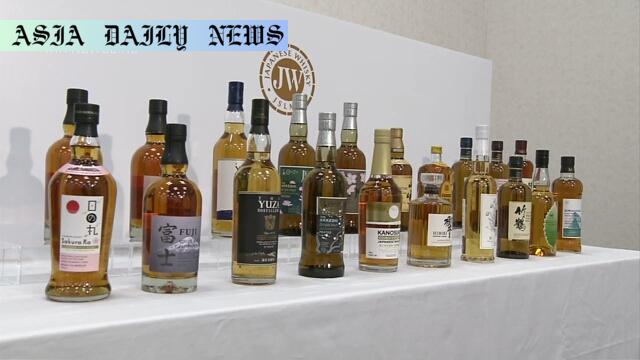Japanese whisky: Industry demands legal guidelines for global authenticity and better brand positioning.
The Japanese whisky industry seeks a clear legal definition to protect its authenticity globally.
Products manufactured abroad are being labeled as ‘Japanese whisky,’ misleading consumers.
The Japan Spirits & Liqueurs Makers Association proposes stricter standards for Japanese whisky production.
Legal clarity could contribute to the elevated global reputation and market value of Japanese whisky.

Growing Concerns Over Authenticity in Japanese Whisky
The authenticity of Japanese whisky has recently come under scrutiny, as the popularity of the spirit continues to surge globally. The Japan Spirits & Liqueurs Makers Association (JSLMA) is now urging the Japanese government to establish clear legal standards for classifying a whisky as ‘Japanese.’ This call for clarity stems from increasing instances of products manufactured entirely abroad being misrepresented as Japanese whisky in international markets. Such practices dilute the brand value and trust associated with Japanese whisky, creating challenges for producers who adhere to traditional Japanese methods and standards.
Currently, the JSLMA follows its own guidelines stating that Japanese whisky must be produced using water sourced in Japan, and the processes of fermentation, distillation, and aging (for at least three years) must occur within the country. However, as these guidelines lack legal enforcement, many international sellers exploit the absence of strict regulations, labeling foreign-made products as Japanese. This not only misleads customers but also threatens the integrity of an industry that has built its reputation on quality and tradition.
Impact on Global Perception and Market Value
Japanese whisky has experienced an unprecedented rise in global demand, with exports reaching approximately $290 million in 2022—a notable increase from $70 million in 2016. This growth highlights the immense popularity and commercial success of Japanese whisky brands, yet it also underscores the need for protective measures. The absence of strict legal standards can erode the trust of consumers, impacting the reputation of legitimate Japanese producers. By establishing legal definitions, Japan can position its whisky as a premium product, enhancing not only its market value but also its cultural identity.
Such measures would hold significant implications for the global spirits industry. A government-sanctioned definition of Japanese whisky could set an example for other countries producing spirits, emphasizing the importance of origin and production integrity. By aligning with international standards for geographical indication, Japan can simultaneously safeguard its brands and contribute to global efforts aimed at preventing the misrepresentation of protected products.
The Role of Legal Guidelines in Strengthening Brand Identity
Tsukahara Daisuke, head of JSLMA, stresses the importance of setting clear and enforceable regulations to protect the identity of Japanese whisky. Legal guidelines, he argues, will not only ensure the authenticity of the product in global markets but also elevate the profile of Japanese whisky, making it synonymous with excellence and traditional craftsmanship. Without strong definitions, the line between genuine Japanese whisky and counterfeit products remains blurred, risking the long-term viability of the industry.
The guidelines proposed by JSLMA, which include the sourcing of water from Japan and a minimum aging period of three years, reflect Japan’s unwavering commitment to quality. These measures also align with the practices observed in other regions known for their whisky, such as Scotland and Ireland, further solidifying Japanese whisky’s place among the world’s finest spirits. Implementing these standards is not merely about safeguarding a business but preserving a cultural treasure.
Conclusion: A Step Toward a Sustainable Future for Japanese Whisky
In conclusion, the push for clear legal definitions of Japanese whisky represents a critical turning point for the industry. It addresses current challenges, including misrepresentation in foreign markets, and positions Japanese whisky as a product of integrity and excellence. As global consumers increasingly seek premium and authentic experiences, such measures will ensure the continued growth and success of the industry, solidifying Japanese whisky’s status as a world-class spirit.
The adoption of these standards will not only protect Japanese producers but also create a benchmark for the global spirits industry. By taking decisive action, Japan can reaffirm its dedication to quality, tradition, and transparency, leaving an indelible mark on the future of whisky production worldwide.



Commentary
The Importance of Authenticity in Global Markets
In the modern era of globalization, authenticity has become a critical factor for businesses seeking long-term success. Products that can reliably align themselves with cultural heritage and traditional craftsmanship often stand out in competitive markets. Japanese whisky serves as a prime example of this phenomenon, building a global reputation for its quality and authenticity. However, the absence of legal definitions threatens this reputation, which is why the push for clear standards is a timely and necessary initiative.
Why the Industry Needs Stricter Regulations
Stricter regulations are not just about protecting a product; they are about safeguarding an industry and community that has devoted centuries to mastering its craft. Japanese whisky is no exception. Inaccurately labeling foreign products as Japanese risks undermining the value of artisans who pour their heart into creating authentic spirits. By setting enforceable standards, Japanese whisky producers can ensure their efforts are recognized and rewarded appropriately.
A Potential Model for the Global Spirits Industry
Beyond its implications for Japanese whisky alone, the establishment of legal guidelines could have global repercussions for the spirits industry. It offers other countries a blueprint for preserving the integrity of their own regional products. Quality assurance measures not only boost consumer confidence but also promote more ethical business practices worldwide.
Ultimately, the move toward legal clarity is not just about protecting corporate interests; it is about valuing history, tradition, and ingenuity. It ensures that future generations can continue to enjoy and celebrate the true essence of Japanese whisky, maintaining its rightful place as a global icon of excellence.